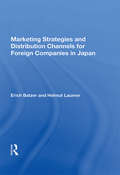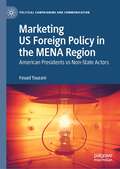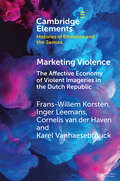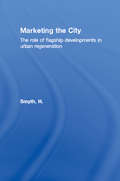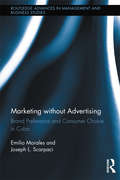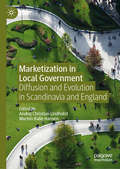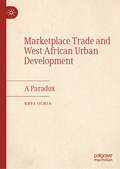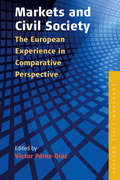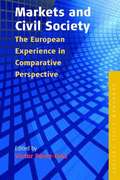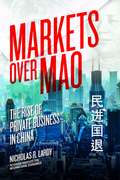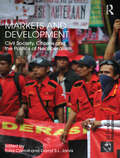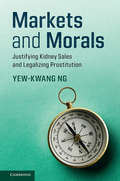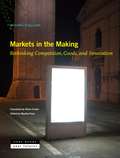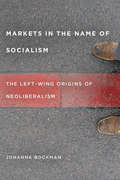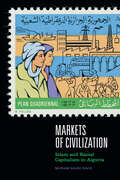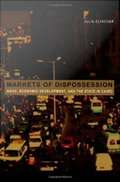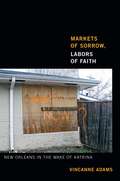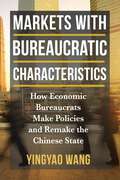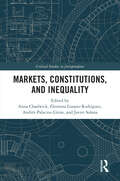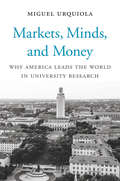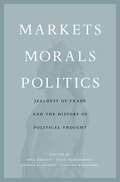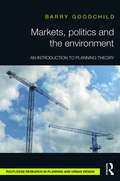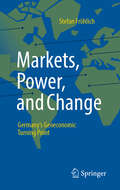- Table View
- List View
Marketing Strategies And Distribution Channels For Foreign Companies In Japan
by Erich BatzerThis book gives an account of concrete market situations and describes marketing strategies and distribution channels of German manufacturing firms, German and foreign trading firms and Japanese partner firms on the Japanese market in important product areas.
Marketing US Foreign Policy in the MENA Region: American Presidents vs Non-State Actors (Political Campaigning and Communication)
by Fouad TouzaniThe book examines how US media, public opinion, interest groups and think tanks respond to US Presidents’ attempts to market their foreign policies in the MENA Region. The scope of the analysis extends from the war on terror to the so-called Arab Spring. It focuses on some case studies including the Arab-Israeli conflict and the Iran nuclear deal. The book fills a gap in the literature pertaining to analyzing US foreign policy in the MENA area from a political communication perspective rather than from IR or a political-theory angle, which remains the dominant literature. In so saying, the book will appeal to students, researchers as well as thinks tanks and policy makers.
Marketing Violence: The Affective Economy of Violent Imageries in the Dutch Republic (Elements in Histories of Emotions and the Senses)
by Karel Vanhaesebrouck Cornelis van der Haven Inger Leemans Frans-Willem KorstenThis Element describes the development of an affective economy of violence in the early modern Dutch Republic through the circulation of images. The Element outlines that while violence became more controlled in the course of the 17th century, with fewer public executions for instance, the realm of cultural representation was filled with violent imagery: from prints, atlases and paintings, through theatres and public spectacles, to peep boxes. It shows how emotions were evoked, exploited, and controlled in this affective economy of violence based on desires, interests and exploitation. This title is also available as Open Access on Cambridge Core.
Marketing Warfare
by Al Ries Jack Trout"A business book with a difference: clear-cut advice, sharp writing and a minimum of jargon." Newsweek "Revolutionary! Surprising!" Business Week "Chock-a-block with examples of successful and failed marketing campaigns, makes for a very interesting and relevant read." USA Today
Marketing the City: The role of flagship developments in urban regeneration
by H. SmythThis book assesses the value of flagship developments and draws out lessons for best policy and practice. It looks at marketing strategies and the sales process for flagship developments and the areas in which they are located for urban regeneration. It discusses the management of marketing strategies and the development through the policy formulation, project implementation and policy/project evaluation. The author examines the strategies to date of 'marketing the city' and the conceptual scope and limits for developing the concept. He also looks at the extent to which people can be integrated into the urban 'product' and the advantages and disadvantages of this. Finally the impact of all these issues is assessed for the policy makers, planners, developers, architects and city authorities.
Marketing without Advertising: Brand Preference and Consumer Choice in Cuba (Routledge Advances in Management and Business Studies)
by Emilio Morales Joseph L. ScarpaciIn 1993, in order to stop an economic freefall on the island of Cuba, Fidel Castro’s government reluctantly instituted a series of reforms to compensate for the demise of foreign aid from Moscow. These policies ushered in a broad spectrum of national and international consumer products and services previously unknown to islanders. In a few short years, Cubans were seeing foreign brands among consumer durables and a broad array of logos brought in by tourists. Today, nearly two decades into these limited market reforms, no systematic research has explored consumer brand awareness among 11 millions Cubans living just 90 miles from the United States. The paucity of academic research stems from the challenges of conducting public/consumer opinion, and official state policy contends that consumer wants and needs are satisfied by either a series of generic and Cuban-made brands, or by independent entrepreneurs who provide brandless products and services. Marketing without Advertising analyzes the role, narratives, and behaviour of consumption in Cuba since 1959. It documents how consumer behaviour has changed since the pre-revolutionary period, with special focus on the early 1990s. The book documents the shift from moral-based rewards in the early years of the Revolution, to the rise of material-based incentives. Cubans have long been exposed to foreign mass media in the form of movies, music videos, cable television shows. Although the Internet is highly regulated, the Cuban Diaspora in exile brings back clothing, personal care products, electronic goods, and magazines that increase the awareness of brand logos, jingles, products, and services. These and related findings from the authors' primary research are ripe with marketing implications such as substitution effects, price elasticity, latent demand for certain products and services, and consumer behaviour.
Marketization in Local Government: Diffusion and Evolution in Scandinavia and England
by Andrej Christian Lindholst Morten Balle HansenMarketization is one of the most powerful reform doctrines reshaping the organization of public service delivery throughout the last four decades. This book revisits conventional ideas and models of marketization and compares how these have diffused and evolved across municipalities in England and Scandinavia. The book highlights the paths and impacts of marketization as diverse and dynamic and asks us to reconsider what and how we think about marketization. The content of the book is co-authored by researchers from four countries and builds upon comparable surveys and case-studies from two longstanding ‘spearhead’ services – parks and roads – for the implementation of marketization. The book appeals to scholars and policy makers with interests in discussions about the history and future of marketization in an international perspective.
Marketplace Trade and West African Urban Development: A Paradox
by Krys OchiaThis book analyses how informal economy traders and the marketplace institution dominate the local economy in African cities. According to the World Bank, being an African reduces the probability that an individual is an entrepreneur in the manufacturing sector by more than 95 percent. Exporting unprocessed strategic raw materials and importing large volumes of finished goods stagnate Africa’s informal sector while creating formal jobs overseas. This suggests employment increases in distributive trade and persistence of the marketplace institution in reducing urban unemployment and income inequality. However, there is limited knowledge of the men and women with permanent stalls in large urban marketplaces that function daily as a temporary city within a city, even though they are the major actors in distribute trade. More important their daily out-of-stall contacts resulting from maintaining complex social and economic relationships that determine the financial health of family, business, and the economy are generally unexplored and largely unknown, but have significant unintended consequences on the urban mobility system. Researchers, planners, development practitioners and policymakers have, therefore, not focused their attention and considered the impacts of the powerful economic institution – marketplaces and traders - in framing transport planning processes and urban development policies, and that is the paradox surrounding marketplace trade and urban development in West Africa.
Markets And Civil Society
by Victor Pa©rez-DaazThe nature of the currently emerging European society, which includes the economic and social transformation of Eastern and Central European countries, has been hotly debated. At its center is the relationship between markets and civil society within political and social contexts. The contributors to this volume offer perspectives from various disciplines (the social sciences, conceptual history, law, economics) and from several European countries in order to explore the ways in which markets influence various forms of civil society, such as individual freedom, social cohesion, economic effectiveness and democratic governance, and influence the construction of a civil society in a broader sense.
Markets And Civil Society
by Victor Pérez-DíazThe nature of the currently emerging European society, which includes the economic and social transformation of Eastern and Central European countries, has been hotly debated. At its center is the relationship between markets and civil society within political and social contexts. The contributors to this volume offer perspectives from various disciplines (the social sciences, conceptual history, law, economics) and from several European countries in order to explore the ways in which markets influence various forms of civil society, such as individual freedom, social cohesion, economic effectiveness and democratic governance, and influence the construction of a civil society in a broader sense.
Markets Over Mao: The Rise of Private Business in China
by Nicholas LardyChina's transition to a market economy has propelled its remarkable economic growth since the late 1970s. In this book, Nicholas R. Lardy, one of the world's foremost experts on the Chinese economy, traces the increasing role of market forces and refutes the widely advanced argument that Chinese economic progress rests on the government's control of the economy's "commanding heights." In another challenge to conventional wisdom, Lardy finds little evidence that the decade of the leadership of former President Hu Jintao and Premier Wen Jiabao (2003–13) dramatically increased the role and importance of state-owned firms, as many people argue. This book offers powerfully persuasive evidence that the major sources of China's growth in the future will be similarly market rather than state-driven, with private firms providing the major source of economic growth, the sole source of job creation, and the major contributor to China's still growing role as a global trader. Lardy does, however, call on China to deregulate and increase competition in those portions of the economy where state firms remain protected, especially in energy and finance.
Markets and Development: Civil Society, Citizens and the Politics of Neoliberalism (ISSN)
by Toby Carroll and Darryl S.L. JarvisMarkets and Development presents a series of critical contributions focused on the political relationship between citizens, civil society, and neoliberal development policy’s latest form. The dramatic increase of ‘access to finance’ investments, newly gender-sensitive approaches to building neoliberal labour markets, the universal promotion of public-private partnerships, and the ‘development financing’ of extractive industries, have all seen citizens, social movements, and NGOs variously engaged in, and against, neoliberalism like never before. The precise form that this engagement takes is conditioned by both the perceived and real opportunities, and the risks, of an agenda which seeks to intern ‘emerging’ and ‘frontier markets’ deep within a concretising world market, with transformative repercussions for both those involved and, notably, for state-society relations. The contributors to this volume focus on essential aspects of the contemporary neoliberal development agenda and its relationship to and with citizens and civil society, tackling questions related to the roles that various actors within civil society in the underdeveloped world are playing under late capitalism, and how these roles relate to current efforts to establish and extend markets, and market society more broadly, in a neoliberal image. This book was originally published as a special issue of Globalizations.
Markets and Morals: Justifying Kidney Sales and Legalizing Prostitution
by Yew-Kwang NgConsidering efficiency, equality, and morality, this book argues for qualified market expansion, particularly in legalizing kidney sales and prostitution. Legalizing prostitution will benefit both men and women, as argued in a chapter jointly written with Yan Wang. Blood donation without monetary compensation can still result in adequate blood supply if schools educate children that blood donation can actually benefit a donor's health. As a society becomes more advanced, with higher incomes and a better educated populace, more activities can be subject to market exchange, with gradual popular acceptance. Without serious misinformation and irrationality, inequality/fairness as such cannot be a valid reason for limiting the scope of the market. The book supports the use of markets to increase efficiency while also increasing the effort to promote equality, making all income groups better off.
Markets in the Making: Rethinking Competition, Goods, and Innovation (Near Future Series)
by Michel CallonSlicing through blunt theories of supply and demand, Callon presents a rigorously researched but counterintuitive model of how everyday market activity gets produced.If you’re convinced you know what a market is, think again. In his long-awaited study, French sociologist and engineer Michel Callon takes us to the heart of markets, to the unsung processes that allow innovations to become robust products and services. Markets in the Making begins with the observation that stable commercial transactions are more enigmatic, more elusive, and more involved than previously described by economic theory. Slicing through blunt theories of supply and demand, Callon presents a rigorously researched but counterintuitive model of market activity that emphasizes what people designing products or launching startups soon discover—the inherent difficulties of connecting individuals to things. Callon’s model is founded upon the notion of “singularization,” the premise that goods and services must adapt and be adapted to the local milieu of every individual whose life they enter. Person by person, thing by thing, Callon demonstrates that for ordinary economic transactions to emerge en masse, singular connections must be made.Pushing us to see markets as more than abstract interfaces where pools of anonymous buyers and sellers meet, Callon draws our attention to the exhaustively creative practices that market professionals continuously devise to entangle people and things. Markets in the Making exemplifies how prototypes, fragile curiosities that have only just been imagined, are gradually honed into predictable objects and practices. Once these are active enough to create a desired effect, yet passive enough to be transferred from one place to another without disruption, they will have successfully achieved the status of “goods” or “services.” The output of this more ample process of innovation, as redefined by Callon, is what we recognize as “the market”—commercial activity, at scale.The capstone of an influential research career at the forefront of science and technology studies, Markets in the Making coherently integrates the empirical perspective of product engineering with the values of the social sciences. After masterfully redescribing how markets are made, Callon culminates with a strong empirical argument for why markets can and should be harnessed to enact social change. His is a theory of markets that serves social critique.
Markets in the Name of Socialism
by Johanna BockmanThe worldwide spread of neoliberalism has transformed economies, polities, and societies everywhere. In conventional accounts, American and Western European economists, such as Milton Friedman and Friedrich von Hayek, sold neoliberalism by popularizing their free-market ideas and radical criticisms of the state. Rather than focusing on the agency of a few prominent, conservative economists,Markets in the Name of Socialismreveals a dialogue among many economists on both sides of the Iron Curtain about democracy, socialism, and markets. These discussions led to the transformations of 1989 and, unintentionally, the rise of neoliberalism. This book takes a truly transnational look at economists' professional ideas over 100 years across the capitalist West and the socialist East. Clearly translating complicated economic ideas and neoliberal theories, it presents a significant reinterpretation of Cold War history, the fall of communism, and the rise of today's dominant economic ideology.
Markets of Civilization: Islam and Racial Capitalism in Algeria (Theory in Forms)
by Muriam Haleh DavisIn Markets of Civilization Muriam Haleh Davis provides a history of racial capitalism, showing how Islam became a racial category that shaped economic development in colonial and postcolonial Algeria. French officials in Paris and Algiers introduced what Davis terms “a racial regime of religion” that subjected Algerian Muslims to discriminatory political and economic structures. These experts believed that introducing a market economy would modernize society and discourage anticolonial nationalism. Planners, politicians, and economists implemented reforms that both sought to transform Algerians into modern economic subjects and drew on racial assumptions despite the formally color-blind policies of the French state. Following independence, convictions about the inherent link between religious beliefs and economic behavior continued to influence development policies. Algerian president Ahmed Ben Bella embraced a specifically Algerian socialism founded on Islamic principles, while French technocrats saw Algeria as a testing ground for development projects elsewhere in the Global South. Highlighting the entanglements of race and religion, Davis demonstrates that economic orthodoxies helped fashion understandings of national identity on both sides of the Mediterranean during decolonization.
Markets of Dispossession: Ngos, Economic Development, and the State in Cairo
by Julia ElyacharWhat happens when the market tries to help the poor? In many parts of the world today, neoliberal development programs are offering ordinary people the tools of free enterprise as the means to well-being and empowerment. Schemes to transform the poor into small-scale entrepreneurs promise them the benefits of the market and access to the rewards of globalization. Markets of Dispossession is a theoretically sophisticated and sobering account of the consequences of these initiatives. Julia Elyachar studied the efforts of bankers, social scientists, ngo members, development workers, and state officials to turn the craftsmen and unemployed youth of Cairo into the vanguard of a new market society based on microenterprise. She considers these efforts in relation to the alternative notions of economic success held by craftsmen in Cairo, in which short-term financial profit is not always highly valued. Through her careful ethnography of workshop life, Elyachar explains how the traditional market practices of craftsmen are among the most vibrant modes of market life in Egypt. Long condemned as backward, these existing market practices have been seized on by social scientists and development institutions as the raw materials for experiments in "free market" expansion. Elyachar argues that the new economic value accorded to the cultural resources and social networks of the poor has fueled a broader process leading to their economic, social, and cultural dispossession.
Markets of Sorrow, Labors of Faith: New Orleans in the Wake of Katrina
by Vincanne AdamsMarkets of Sorrow, Labors of Faith is an ethnographic account of long-term recovery in post-Katrina New Orleans. It is also a sobering exploration of the privatization of vital social services under market-driven governance. In the wake of Hurricane Katrina, public agencies subcontracted disaster relief to private companies that turned the humanitarian work of recovery into lucrative business. These enterprises profited from the very suffering that they failed to ameliorate, producing a second-order disaster that exacerbated inequalities based on race and class and leaving residents to rebuild almost entirely on their own. Filled with the often desperate voices of residents who returned to New Orleans, Markets of Sorrow, Labors of Faith describes the human toll of disaster capitalism and the affect economy it has produced. While for-profit companies delayed delivery of federal resources to returning residents, faith-based and nonprofit groups stepped in to rebuild, compelled by the moral pull of charity and the emotional rewards of volunteer labor. Adams traces the success of charity efforts, even while noting an irony of neoliberalism, which encourages the very same for-profit companies to exploit these charities as another market opportunity. In so doing, the companies profit not once but twice on disaster.
Markets with Bureaucratic Characteristics: How Economic Bureaucrats Make Policies and Remake the Chinese State (The Middle Range Series)
by Yingyao WangChina’s breathtaking economic development has been driven by bureaucrats. Even as the country transitioned away from socialist planning toward a market economy, the economic bureaucracy retained a striking degree of influence and control over crafting and implementing policy. Yet bureaucrats are often dismissed as faceless and inconsequential, their role neglected in favor of party leaders’ top-down rule or bottom-up initiatives.Markets with Bureaucratic Characteristics offers a new account of economic policy making in China over the past four decades that reveals how bureaucrats have spurred large-scale transformations from within. Yingyao Wang demonstrates how competition among bureaucrats motivated by careerism has led to the emergence of new policy approaches. Second-tier economic bureaucrats instituted distinctive—and often conflicting—“policy paradigms” aimed at securing their standing and rewriting China’s long-term development plans for their own benefit. Emerging from the middle levels of the bureaucracy, these policy paradigms ultimately reorganized the Chinese economy and reshaped state-market relations. Drawing on fine-grained biographical and interview data, Wang traces how officials coalesced around shared career trajectories, generational experiences, and social networks to create new alliances and rivalries. Shedding new light on the making and trajectory of China’s ambitious economic reforms, this book also provides keen sociological insight into the relations among bureaucracy, states, and markets.
Markets, Capitalism and Urban Space in India: Right to Sell (Routledge Research on Urban Asia)
by Anirban AcharyaThis book analyses the question of the right to the city, informal economies and the non-western shape of neoliberal governance in India through a new analytic: the right to sell. The book examines why and how states attempt to curb, control, and eliminate markets of urban informal street vendors. Focusing on Kolkata, the author provides a theoretical explanation of this puzzle by distilling and analysing the inherent tensions among the constitutive elements of neoliberal governance, namely, growth imperative, market activism, and corporatization, and demonstrates its implications for the formal/informal boundaries of the economy. A useful addition to the existing literatures on the right to the city, informal economies, and the shapes that neoliberalism takes in the non-west, the book provides a non-western counter to accounts of neoliberalism and will be of interest to academics working in the fields of South Asian Studies, Urban Studies, and Political Economy.
Markets, Constitutions, and Inequality (Critical Studies in Jurisprudence)
by Anna Chadwick, Eleonora Lozano-Rodríguez, Andrés Palacios-Lleras, and Javier SolanaThis interdisciplinary collection examines the significance of constitutions in setting the terms and conditions upon which market economies operate. With some important exceptions, most notably from the tradition of Latin American constitutionalism, scholarship on constitutional law has paid negligible attention to questions of how constitutions relate to economic phenomena. A considerable body of literature has debated the due limits of the exercise of executive and legislative power, and discussions about legitimacy, democracy, and the adjudication of rights (civil and political, and socioeconomic) abound, yet scant attention has been paid by constitutional lawyers to the ways in which constitutions may protect and empower economic actors, and to how constitutions might influence the regulation and governance of specific markets. The contributors to this collection mobilize insights from other disciplines – including economic theory, history, and sociology – and consider the relationship between constitutional frameworks and bodies of law – including property law, criminal law, tax law, financial regulation, and human rights law – to advance understanding of how constitutions relate to markets and to the political economy. This book’s analysis of the role constitutions play in shaping markets will appeal to scholars and students in law, economics, history, politics, and sociology.
Markets, Minds, and Money: Why America Leads the World in University Research
by Miguel UrquiolaA colorful history of US research universities, and a market-based theory of their global success. American education has its share of problems, but it excels in at least one area: university-based research. That’s why American universities have produced more Nobel Prize winners than those of the next twenty-nine countries combined. Economist Miguel Urquiola argues that the principal source of this triumph is a free-market approach to higher education. Until the late nineteenth century, research at American universities was largely an afterthought, suffering for the same reason that it now prospers: the free market permits institutional self-rule. Most universities exploited that flexibility to provide what well-heeled families and church benefactors wanted. They taught denominationally appropriate materials and produced the next generation of regional elites, no matter the students’—or their instructors’—competence. These schools were nothing like the German universities that led the world in research and advanced training. The American system only began to shift when certain universities, free to change their business model, realized there was demand in the industrial economy for students who were taught by experts and sorted by talent rather than breeding. Cornell and Johns Hopkins led the way, followed by Harvard, Columbia, and a few dozen others that remain centers of research. By the 1920s the United States was well on its way to producing the best university research. Free markets are not the solution for all educational problems. Urquiola explains why they are less successful at the primary and secondary level, areas in which the United States often lags. But the entrepreneurial spirit has certainly been the key to American leadership in the research sector that is so crucial to economic success.
Markets, Morals, Politics: Jealousy of Trade and the History of Political Thought
by Béla KapossyWhen István Hont died in 2013, the world lost a giant of intellectual history. A leader of the Cambridge School of Political Thought, Hont argued passionately for a global-historical approach to political ideas. To better understand the development of liberalism, he looked not only to the works of great thinkers but also to their reception and use amid revolution and interstate competition. His innovative program of study culminated in the landmark 2005 book Jealousy of Trade, which explores the birth of economic nationalism and other social effects of expanding eighteenth-century markets. Markets, Morals, Politics brings together a celebrated cast of Hont’s contemporaries to assess his influence, ideas, and methods. Richard Tuck, John Pocock, John Dunn, Raymond Geuss, Gareth Stedman Jones, Michael Sonenscher, John Robertson, Keith Tribe, Pasquale Pasquino, and Peter N. Miller contribute original essays on themes Hont treated with penetrating insight: the politics of commerce, debt, and luxury; the morality of markets; and economic limits on state power. The authors delve into questions about the relationship between states and markets, politics and economics, through examinations of key Enlightenment and pre-Enlightenment figures in context—Hobbes, Rousseau, Spinoza, and many others. The contributors also add depth to Hont’s lifelong, if sometimes veiled, engagement with Marx. The result is a work of interpretation that does justice to Hont’s influence while developing its own provocative and illuminating arguments. Markets, Morals, Politics will be a valuable companion to readers of Hont and anyone concerned with political economy and the history of ideas.
Markets, Politics and the Environment: An Introduction to Planning Theory
by Barry GoodchildMarkets, Politics and the Environment answers three groups of question: What is planning?’ and as part of this ‘What are its key features as a style of social practice and action?’ and ‘How does planning as a style of social practice relate to social and economic change? How, as part of the justification for planning, might claims of valid technical knowledge be constructed? What is meant by ‘rational’? What is the contribution of pragmatism as a supplement or replacement to rationalism? How might rationality and pragmatism be adapted to postmodernism and the requirements of diversity? Finally, how may concepts of planning be reoriented towards sustainable development as a collective duty? How might sustainable development be reworked in relation to planning as a means of managing and stimulating change? Each group of question is discussed in a separate chapter and is associated with different theories, debates and examples of practice. Markets, Politics and the Environment concludes that the full implications of sustainable development and climate change point in the direction of a different type of state- a green state whose future functioning can draw on planning theory but at present can only be conceived as a sketchy outline.
Markets, Power, and Change: Germany's Geoeconomic Turning Point
by Stefan FröhlichWhile the issue of Ukraine is engaging the public and fostering a greater interest in foreign and security policy topics, global economic policy issues and debates largely pass most people by and are primarily discussed by economists and economic historians. Unlike during the Euro crisis, whose complexities overwhelmed society as a whole, questions about supply chains, resource security, and technological change have now reached the press and media. However, for most people, the necessity of a related paradigm shift in German foreign and economic policy is not evident. This is particularly true for the increasing importance of using economic means to enforce (power) political interests – in other words, the new "geoeconomics". This book situates the scientific findings and debates surrounding this term within the global confrontation between the USA, China, and Europe, translating them into language that everyone can understand. The author contributes to the public debate in Germany with this essay and therefore addresses the interested public.
